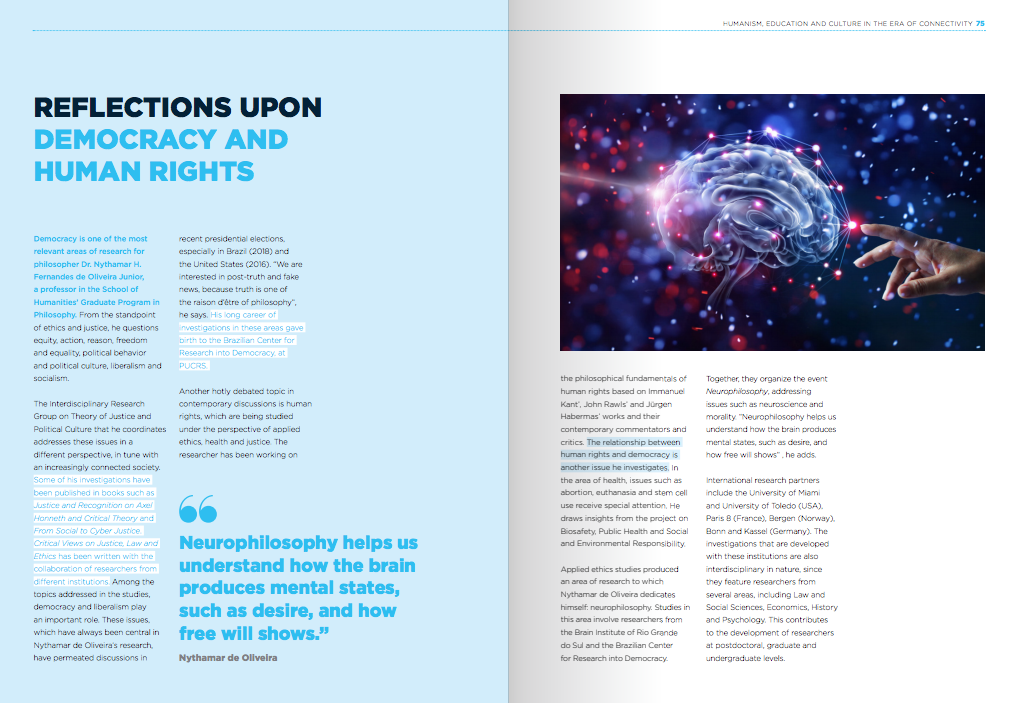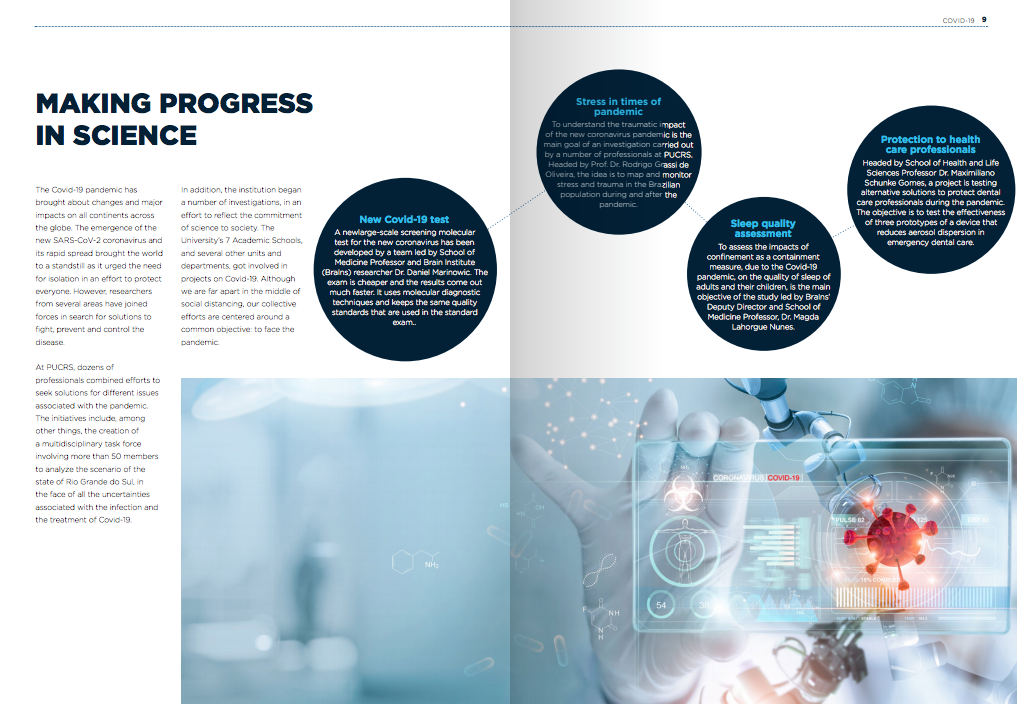Publication addresses innovative research in all areas in multidisciplinary way
 Regarded as the best private university in the country by Times Higher Education (THE), PUCRS stands out, among other competences, for its structure and performance in research. The University fared higher in 2020, as in other years, especially in the categories Research and Citations. In view of this legacy, the PUCRS Excellence in Research was launched during a webinar in honor of the National Science and Researcher Day.
Regarded as the best private university in the country by Times Higher Education (THE), PUCRS stands out, among other competences, for its structure and performance in research. The University fared higher in 2020, as in other years, especially in the categories Research and Citations. In view of this legacy, the PUCRS Excellence in Research was launched during a webinar in honor of the National Science and Researcher Day.
The publication brings together some of the main scientific studies developed at PUCRS. In an excerpt of an article on her studies, Science and transformation of society, Dr. Carla Bonan, Vice President for Research and Graduate Studies of PUCRS, describes the investigations that are carried out at the institution: “The quality of the research developed at PUCRS is a reflection of a set of strategies and actions, as well as the encouragement to interdisciplinarity and initiatives aimed at increasing internationalization”.
The publication, which featured more than 50 PUCRS researchers, includes studies from all areas. Check out some of the transformative solutions that contribute to global society issues:
Investigations on the brain, healthy aging, diseases, pharmaceuticals, drugs, among other things, show the work of researchers who are dedicated to discovering how science can boost the quality of human life in different stages of life. These include Sleep disorders and child and adolescent health, by Magda Lahorgue Nunes; Stress, trauma and drugs: structural and genetic changes in the brain, by Rodrigo Grassi-Oliveira; and Cognitive interventions for a healthier life, by Margareth da Silva Oliveira.
Including topics such as the analysis of different perspectives of social violence to fundamental rights and ancestral wisdom, the articles present ancient issues of civilization in a contemporary way. These include Sociology of Punishment: Violence and imprisonment, by Rodrigo Ghiringhelli de Azevedo; Multidimensional poverty, self-efficacy and gender, by Izete Pengo Bagolin; and The right to quilombola origins, by Patrícia Krieger Grossi.
 With focus on human rights, Latin American realities and methods to improve social relations and education, the studies address different current reflections. Among them, Reflections upon democracy and human rights, by Nythamar H. Fernandes de Oliveira Junior; Teacher development to build the future, by Marcos Villela Pereira; and Linguistics applied to health, by Lilian Cristine Hübner.
With focus on human rights, Latin American realities and methods to improve social relations and education, the studies address different current reflections. Among them, Reflections upon democracy and human rights, by Nythamar H. Fernandes de Oliveira Junior; Teacher development to build the future, by Marcos Villela Pereira; and Linguistics applied to health, by Lilian Cristine Hübner.
With a watchful eye on the emerging environment and health issues of the planet, articles in the section proposes more friendly solutions for nature. These include Research on the conservation of birds and their habitats, by Carla Suertegaray Fontana; Solar cells and photovoltaic systems, by Izete Zanesco and Adriano Moehlecke; and Sustainable solutions from field to industry, by Eduardo Cassel.
By promoting an increasingly changing future, articles in this section address new technologies, machine learning, digital entrepreneurship and simulations of what is to come. Here are some of the articles: Computational models to simulate natural systems, by Walter Filgueira de Azevedo Junior; Artificial intelligence with a focus on social good and sustainability, by Rafael Heitor Bordini; and International reference in crowd simulation, by Soraia Raupp Musse.

Researchers from the most diverse areas have joined a real race against time in search of solutions to combat, prevent and control the new coronavirus pandemic. Among the main actions of PUCRS are the creation of a new test for Covid-19; studies on aspects of mental health during this period; assessments of quality of sleep; protection of health professionals; analysis of the impact of transmission and different approaches to fight the disease.
Considered the 13th country for scientific research, the academic work in Brazil grows every year. More than 250,000 papers were written from 2011 to 2016, according to multidisciplinary data from the Web of Science, edited by Clarivate Analytics and published in Revista Época.
This same report showed that 60% of gross internal spending on research and development is associated with the work of higher education institutions. At least 10% are invested in non-targeted research and 30% for exclusive purposes. “The biggest recipients are the agricultural (10%), industrial technology (6%) and health (5%) sectors”.
The areas of clinical medicine, plant and animal science, agrarian sciences, chemistry, physics and engineering had the largest number of papers, according to Época.
“The scientific investigations carried out at PUCRS are directly related to the performance of its research structures, composed by 377 Groups accredited by the National Council for Scientific and Technological Development (CNPq), 16 Centers, 104 Laboratories and 48 Multidisciplinary Research Groups, as well as 4 Institutes. Moreover, the research activities are integrated with the 23 Graduate Programs, made up of 23 Master’s and 22 Doctoral degree programs, involving 344 accredited faculty members”, Carla Bonan adds. The complete list of research structures of PUCRS can be found in the Journal.